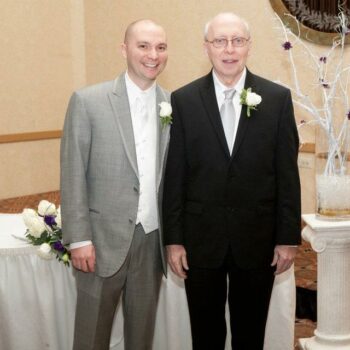Aaron Clark

Use your skill set. Find ways that you can help the primary caregivers. I work in the financial sector, so I helped my mother and sister figure out how to get my father qualified for Medicare and Medicaid. Since my father was the one who had been working and needed to retire, I also helped my mother move funds around.
January 25th, 2018
Aaron Clark lost his father, Erik, and his grandmother, Jane, to Alzheimer’s.
I was 14 years old when my grandmother was diagnosed with Alzheimer’s at 80. Initially, I didn’t understand the diagnosis. Her present became her past, and she thought that my father was her brother and my aunt was her sister. She was a librarian and a minister’s wife. Before her diagnosis, she had always been proper and well put together. Alzheimer’s stole that from her. As a young adult, I had difficulty realizing how important it was to still visit her, even when she didn’t act like “grandma” anymore. However, my grandfather spent time with her every day and treated her just as he did before the disease took her away. He set a great example for how I think family members should treat Alzheimer’s patients.
When my father was later diagnosed with Alzheimer’s, my family was surprised. He was 62 years old and still working. He began making mistakes at work that were uncharacteristic of him, and because his job involved others’ safety, he retired early. Since I lived several hours away from my parents, my wife and I saw my mother and father every few months. Each time we visited, I noticed changes in my father that my mother and sister couldn’t see, because they were with with him every day. He became increasingly dependent on them.
While I wasn’t my grandmother or father’s primary caregiver, I would share the following advice with others who are in a similar position:
- Use your skill set: Find ways that you can help the primary caregivers. I work in the financial sector, so I helped my mother and sister figure out how to get my father qualified for Medicare and Medicaid. Since my father was the one who had been working and needed to retire, I also helped my mother move funds around to ensure they were on a budget and well taken care of. While I help companies with their pension plans and have some knowledge of financial terminology, I don’t work with investments. Therefore, I conducted online research and found an elder attorney through the Alzheimer’s Association who could help us with our funds and qualifying for various programs.
- Realize that the primary caregivers’ perception of a loved one with Alzheimer’s may be different from your perception: When you visit your loved one with Alzheimer’s, try not to have too many expectations. The primary caregivers are with the patient every day and do not see some of the big changes that someone visiting each month may notice. My mother struggled with watching her husband, who had once been very independent, become dependent on her. Her perception of my father’s decline differed from mine because of how often she was with him. My wife and I saw how much he changed each time we visited and suggested putting him into a 24-hour care home, something my mother and sister struggled with. However, after they could no longer physically take care of him, we agreed as a family that putting him into a care home was the right thing to do.
- Give the primary caregivers grace by thanking them for everything they do and apologizing if you were hard on them: I didn’t always understand the depth of what my mother and sister were going through, so I may have been a little hard on them. I only saw bits and pieces of their experience and was not in the thick of it all. You may think you have the best suggestion, but realize that some suggestions are easier said than done. The primary caregivers make the best decisions they can in the moment and sometimes, they are simply trying to survive.
- Reflect on the primary caregivers’ advice: I think my mother and sister would suggest that caregivers should love the patient more and more each day, avoid arguing or trying to remember for him or her by forcing memories on a loved one, go with the flow, laugh—or try to make the patient laugh—and take time to step away from the situation for a moment, if needed.
If my family hadn’t gone through this experience together, I’m not sure we would have fully understood what each of us was going through. Working together as a family is what my father and grandparents would have wanted.